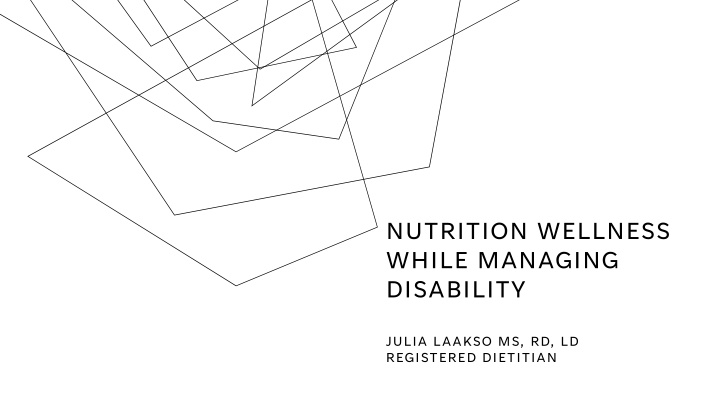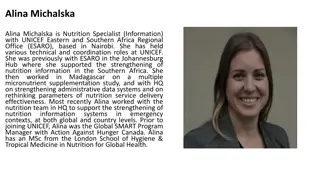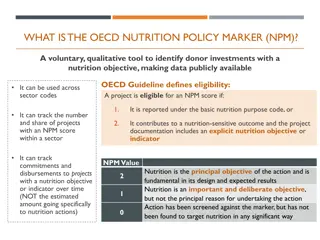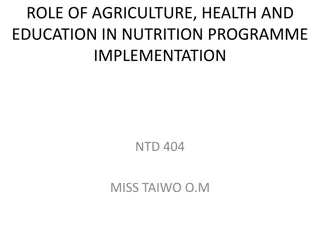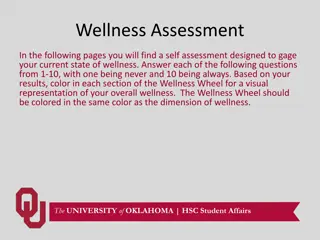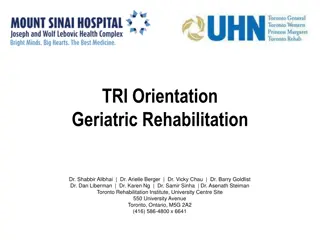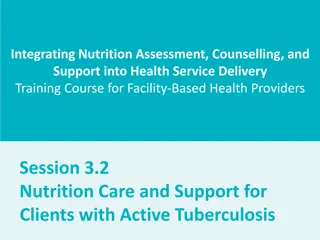Managing Nutrition for Wellness and Disability
Understanding and meeting nutritional needs while managing a disability is vital for overall wellness. Learn about the importance of nutrition, tools to consume nutrient-dense foods, barriers to meeting needs, and nutrient interactions. Discover how food choices can affect symptom management, with tips on designing a diet to alleviate or manage specific symptoms through therapeutic approaches.
Download Presentation

Please find below an Image/Link to download the presentation.
The content on the website is provided AS IS for your information and personal use only. It may not be sold, licensed, or shared on other websites without obtaining consent from the author.If you encounter any issues during the download, it is possible that the publisher has removed the file from their server.
You are allowed to download the files provided on this website for personal or commercial use, subject to the condition that they are used lawfully. All files are the property of their respective owners.
The content on the website is provided AS IS for your information and personal use only. It may not be sold, licensed, or shared on other websites without obtaining consent from the author.
E N D
Presentation Transcript
NUTRITION WELLNESS WHILE MANAGING DISABILITY JULIA LAAKSO MS, RD, LD REGISTERED DIETITIAN
AGENDA Meeting nutritional needs while managing disability Why is it important? Nutrition and symptom management Tools to help consume nutrient-dense foods Barriers to meeting nutritional needs Nutrient and medication interactions Misguidance and villainization within the Wellness Industry True meaning of Wellness 2
MEETING NUTRITIONAL NEEDS Why is it important? Nutrients provide the body with sustenance for various functions: Nerve conduction Electrolyte management Bone and muscle strength Wound healing Support immunity and healing time Aid in symptom management 3
NUTRITION AND SYMPTOM MANAGEMENT Meeting nutritional needs Food intakes can both alleviate or exacerbate symptoms Important to discuss burdensome symptoms with physician and care team to determine etiology Once etiology is determined, prescribed diet can become part of care plan Diet prescriptions are highly individualized for symptom and disease management Next two slides do not serve as medical advice 4
NUTRITION AND SYMPTOM MANAGEMENT Meeting nutritional needs Symptom Management through Therapeutic Diets Swelling or edema: Reduce sodium intake Possible fluid restriction Headaches: Reduce artificial sweetener or sugar alcohols Ensure proper hydration Gastrointestinal Distress: Reduce high fiber foods, greasy foods, or sugar alcohols 5
NUTRITION AND SYMPTOM MANAGEMENT Meeting nutritional needs Symptom Management through Therapeutic Diets Muscle cramping Ensure proper hydration May require potassium or magnesium POTS: Additional sodium intakes A pickle a day Crohn s, gastroparesis, diverticulitis, colitis: Requires thorough personal determination of flare-inducing foods 6
TOOLS TO HELP CONSUME NUTRIENT-DENSE FOOD Utilize Processed Foods Pre-cut fruit or pre-diced veggies, pre-washed greens Prepared proteins: rotisserie chicken, canned tuna, canned beans Sodium content can be a concern Canned items can be rinsed in a colander to reduce sodium Readily available: Protein and mass gain powders Microwavable rice or grain pouches Plain, unflavored items have no added sodium Frozen, steamable veggies or grains Preferably no sauce or light sauce if sodium intake is a concern Utilize Adaptive Equipment Food choppers, one-handed cutting boards, nylon knives 7
BARRIERS TO MEETING NUTRITIONAL NEEDS What can stand in the way? Meeting nutritional needs can prove difficult when faced with various hurdles: Nutrient and medication interactions Misguidance and villainization in the Wellness Industry 8
NUTRIENT AND MEDICATION INTERACTIONS Barriers to meeting nutritional needs Nutrients can alter medication effectiveness by competing for absorption in the gut Diuretics can deplete magnesium and potassium Calcium Channel Blockers can deplete potassium Ace Inhibitors can deplete iron and potassium Lithium requires a stable sodium intake (no sudden changes) Coumadin requires a stable vitamin K intake (no sudden changes) Antibiotics can alter gut flora 9
VILLAINIZATION IN THE WELLNESS INDUSTRY Barriers to meeting nutritional needs Misguidance and villainization of various nutrition tools Processed Foods Protein or mass powders Stigma: lazy, cutting corners, not trying hard enough Wellness Industry: Messages are often based on shame, fear, and propaganda/profit Targets vulnerability of those who are searching for ways to feel better with chronic illness or disability Ableist: Benefits come to those who are already well Elitist: Benefits come to those who can afford them 10
WHAT IS WELLNESS? Your personal definition of Wellness Wellness is one of the most personal, nuanced concepts but often begins with nourishment Utilizing processed foods or helpful tools to care for yourself is not shameful Work smarter, not harder. Fed is Best. Remember who you are, what you need, and how you best serve yourself 11
THANK YOU Julia Laakso, MS, RD, LD 12
